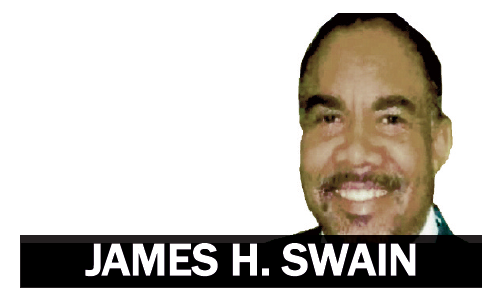By James Swain
This month we are called upon to look back on the history of black Americans and, consequently, more broadly, to review the history of Africans in the diaspora. We know that many of the important milestones in the collective lives Black Americans all too often are missing from the pages of the history books provided to us in primary, middle and secondary school. When there is a mention, it is inevitably trite, superficial and sometimes, just plain wrong.
So, in the face of a missing, misrepresented and undervalued, historical record, we have Black History Month. Here, we mark the need to tell the untold stories of black lives of consequence. We sound the alarm for recording and recounting the special consequences of black lives on history. We urge recognition of the unique consequences of American and World history on generations of black lives.
Spreading the stories of the cultural, economic, social and political lives of Black Americans over the past five centuries in America, is one of the central missions of Black History Month. But, if we are not mindful, we will lose a significant opportunity to record the history of blacks in the twentieth century viewed from the lens of those closest to us.
According to the latest available census estimates, there are about 42 million black Americans living in the United States. Approximately six million, or only fourteen percent of black Americans alive today were born before 1954 and less than two million, under five percent, of living black Americans were born before World War II. Their stories are a fulsome treasure trove of lived history, but it is also a fleeting treasure trove.
So, I am urging us all to make certain that we urgently undertake the preservation of the record of the lives of our people. What do the oldest men and women in your family have to share about their impact on history, or the impact of historical events of their lives? What first–hand recollections have they received from their parents and grand-parents? Are there ghost stories? Are there tales of exciting sports exploits, precarious run-ins with the law, or stories of courtship, dance clubs and church? Are there personal before and after experiences that flesh out and reinforce the familiar historical narratives of Jim Crow discrimination, segregation and racial injustice?
Let me suggest this: the paperwork available through Ancestry.com type services; DNA testing, Census data and other public records of the past are fixed and will be around as long as they are preserved. But the memories of our eldest relatives, our parents, grand-parents and great-grand parents, in their own words, will only last if they are purposely preserved. Although most genealogists readily admit that oral family histories can be and often are incomplete, inaccurate and misleading, they also acknowledge that nothing beats strong and accurate first-hand knowledge and nothing tells the story of history better than the stories of the people who lived it.
So spend a few hours this month with your elders. Prepare specific questions and record the conversations. Ask about chores, employment, jobs, hustles, and friendships. Ask about their ‘as lived’ perspectives on historical events. Ask about the lives of their parents and grandparents. Most of all, listen and learn, find out how they kept on pushing and why. After all, when it comes to our ancestors, if they hadn’t survived, they wouldn’t be here to tell the tale-and neither would we.










No Comment